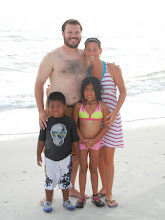I'm once again reading the book "The Connected Child." It's a book that focuses on helping the adopted child overcome trauma, abuse, and neglect. I read it once before when Goose and I first started doing attachment therapy last fall. I found it to be a really great book with lots of real life applications of how to effectively parent adopted children who have had less then optimal beginnings. As I dived into many recommended books on helping adopted kids heal I realize now that I wasn't really taking it all to heart. In trying to solve the mystery of what has been going on for my child I read through the pages not really believing that this was her problem. Even though we have seen the research that suggests that even children adopted at birth or as infants can have issues with attachment, anxiety, sensory processing, and even nerocognitive impairments I guess I just didn't see it. I have been looking for the "quick fix." Although I know there is no such thing I have been holding out for one anyway. I have been attending an adoption support group for the last several weeks. It has been so wonderful to connect with moms who are going through the same things we are. It's so true that no one else really understands because they aren't living it day to day. To hear mom's express the same concerns, frustrations, and even heart aches has made me realize that I haven't really given any of this therapeutic parenting a chance. I didn't believe that Goose really needed it, mostly because it means I have so much work to do. the therapeutic parenting that she needs is intensive, time consuming, and just down right hard. It's the complete opposite of how I thought I would parent and for sure not the way I was parented. All that being said it's what she needs. If we are going to truly help her deal with her anxiety, hyperactivity, and fears we are going to have to dive head first into this new parenting style. This means looking at her behavior issues in a new way, seeing them as a fear response. Instead of "time outs" she needs "time in," when her behavior is at it's worst we need to do "pull close parenting" not get out of my face parenting. When she makes a bad choice we need to refrain from using emotions but rather guide and encourage her to re-do the choice the right way. Compassion will be the emotion most exhibited not frustration. I'm both excited and scared to really do this, it's like learning a new language but it's the language she needs me to learn. I know it will take time and lots of practice to get it right but she is so worth it.

No comments:
Post a Comment